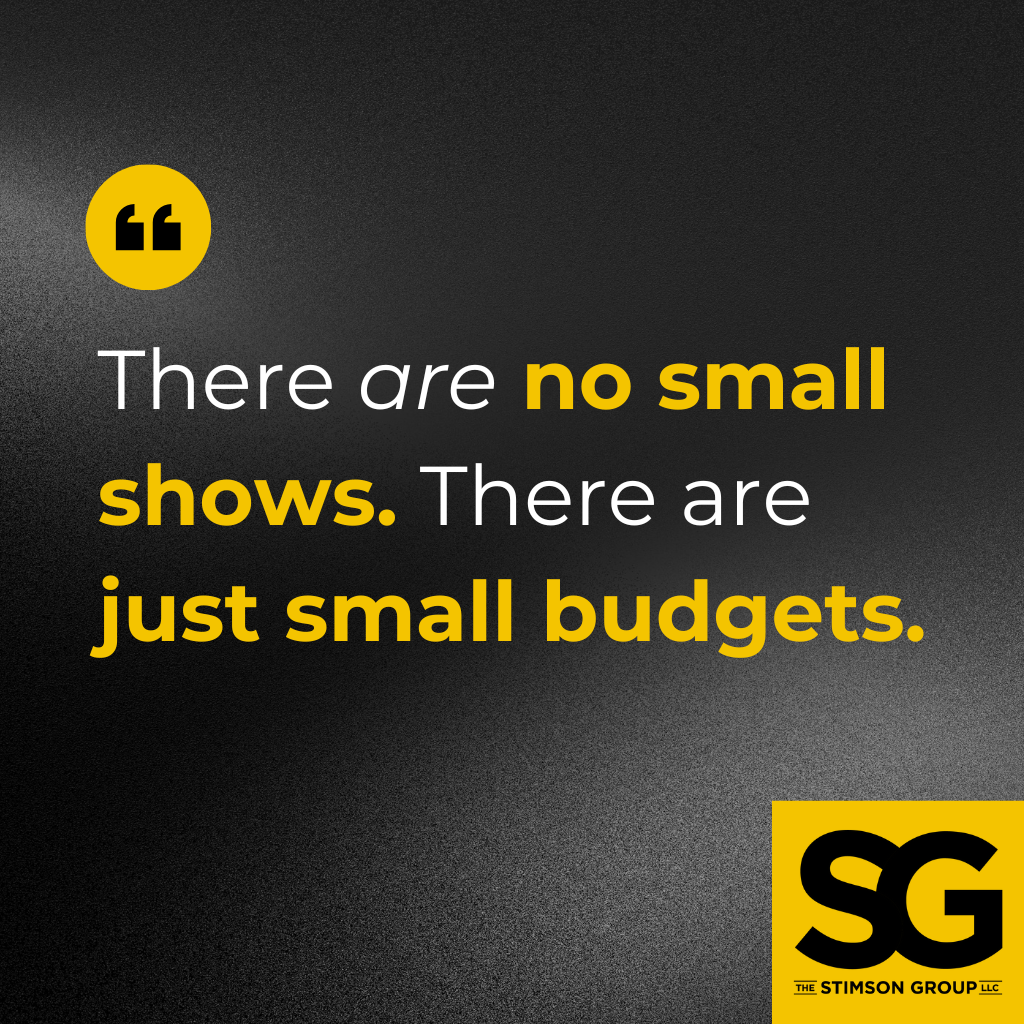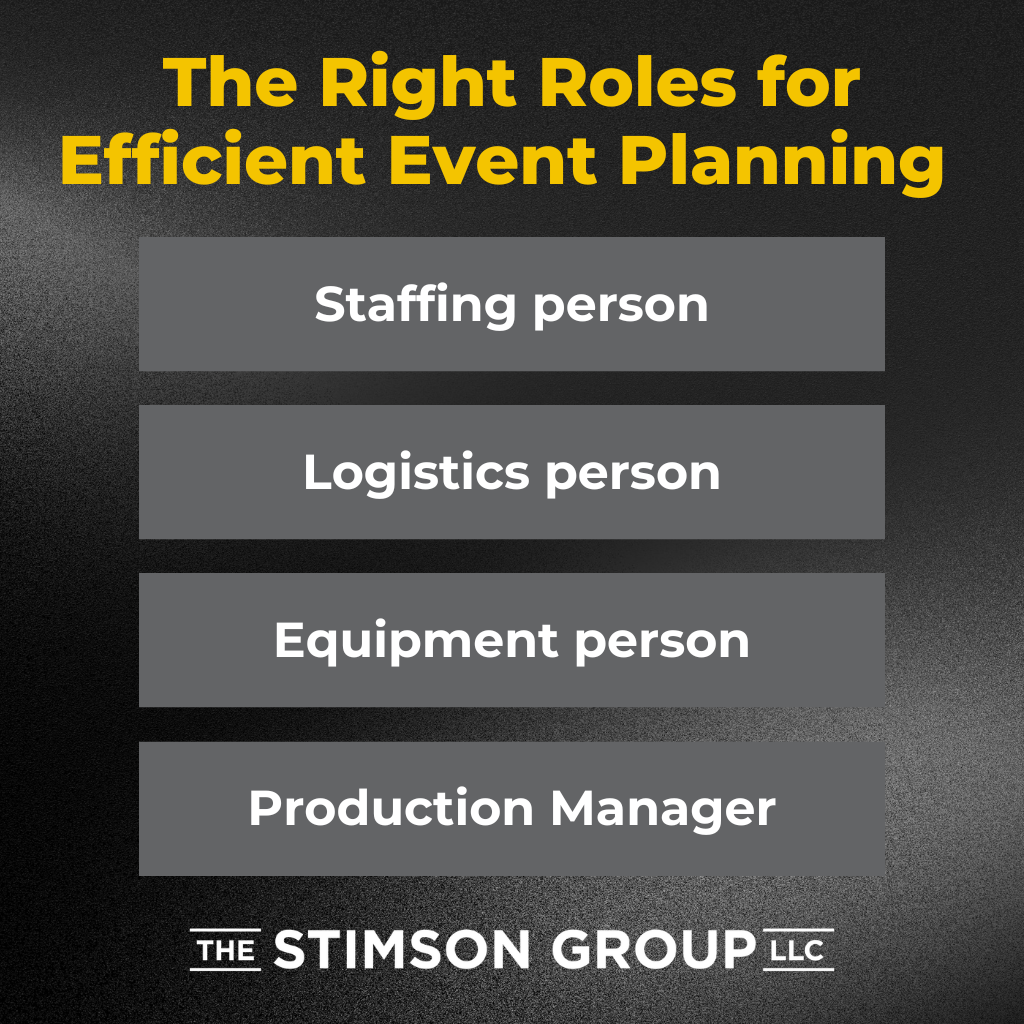
Listen instead on your Monday Morning Drive:
Everyone’s definition of a “big show” is different.
To you, it might mean high revenue. For others, it’s about profile, complexity, multiple rooms, or being hard-won. But what’s a “small show,” then?
Here’s my take: There are no small shows. There are just small budgets. The most important show you do this month could be your smallest revenue event.
There’s no room for small thinkers when handling events, no matter the size.

The Myth of Big vs. Small
What’s the biggest show you’ve been involved with? What made it big? How significant was your role?
Early in my career, I worked on Coca-Cola’s 100th anniversary show in Atlanta. The production budget was $10 million, making it one of the largest corporate events ever produced at the time.
I had a decent role as a slide projectionist. Back then, slides comprised most of the media content, along with some video and 35mm film.
The audio, lighting, and scenery were massive. Moving sets and miniature delivery vehicles drove through the audience onto the stage. Hundreds of singers and dancers performed.
One local AV company had a small but important part: providing intercom for the entire show, composed of about 72 drops of Clearcom on four channels, with miles of cable.
I guarantee that technician (actually a salesperson acting as a technician) lists “part of the biggest show ever produced in North America” on his resume.
What Really Makes a Show “Big”?
What warrants a “big show” designation in your business?
- Dollar figure over $100,000?
- More than five technicians?
- Travel requirements?
- Need for a project manager?
- Technical director involvement?
- Account executive going on-site?
Do you do certain things because “that’s what you do on big shows”?
When we use “big show processes” on all our shows, we eliminate scalability. If every job needs a project manager, is that because it’s a “big show” or simply because it’s your standard process?

The Right Process vs. The Right Size
When a salesperson confirms an order, do you immediately assign a project manager who starts reserving gear, booking technicians, ordering scissors lifts, and scheduling trucks?
Is this because it’s a “big show” or because you have a project manager system?
A planning team might handle the same job differently:
- Staffing person: Put some people on that show
- Logistics person: Schedule a truck
- Equipment person: Check if we need to sub-rent anything
- Production Manager: “Would you like to scrub the order, or shall I do it for you?”
This doesn’t mean it’s not an important show. It means the right people are looking at it to ensure success.
Why Job Titles Indicate Process Problems
The title “Project Manager” often indicates a failure to define operational processes. It means you need someone to walk an order through your system, or it won’t get done properly. This person protects the job from organizational gaps.
Most companies don’t actually need this role, but they’ve come to rely on it. When you run out of project managers, work gets sloppy, mistakes happen, and you hire another project manager, which doesn’t actually increase capacity.
Project managers have limited capacity by definition. There’s only so much they can handle at once. If you rely on project managers, it means you have process problems.
Other roles, like Technical Directors, Production Managers, and Account Executives, often function as project managers, too.
Planning Team vs. Project Management
Instead of project managers, assemble a planning team.
A planning team makes sure everything needed for a sales order gets delivered successfully. A good planning team might assign a project manager to:
- Do the final review
- Take the job into the field
- Manage the execution team
- Act as the project lead
- Hold all information
- Supervise for proper execution
- Report back on changes and expenses
This type of project manager functions as an in-field account manager with technical aptitude and crew management skills.
Production Managers and Their Function
Production managers do more planning than project managers. They:
- Create drawings
- Decide what gets outsourced
- Select crew members
- Choose specific equipment
- Coordinate with lighting designers
- Manage rigging and audio points
- Ensure screens fit properly
They manage many moving parts and get deeply involved in the project, assuming it’s “bespoke” or custom.
But we don’t have many truly bespoke shows. Often, we create custom solutions where they’re not needed, using stock elements with a custom touch.
In a scalable organization, a production manager uses the planning team as resources and submits orders for:
- Labor
- Travel
- Subrented equipment
- Specialty equipment
- Technical drawings
Technical Directors and Their Role
Technical Directors take design parameters and create the inputs that generate the desired output. They:
- Take a scenic design and determine how scenery gets built and finished
- Turn lighting designs into equipment requests
- Define complex events so individual departments can execute
Technical Directors work closely with department heads, defining the technical aspects before handing designs to production managers for execution.
What’s Right for Your Show Size?
It doesn’t matter if a show is small, medium, or large. Use the tool appropriate for your system and process.
If you can’t set up two speakers on sticks in a parking lot without a technical director, you’ll limit your selling capacity.
A simple scope of work can still be mission-critical. For instance, a job set up in a museum between specific morning and afternoon hours may be logistically complex but technically simple.
Simplify Through Planning
Don’t reinvent the wheel for each show. Apply standards first.
When I was building scenery, we used standard construction protocols, just like building a house or shed. Let your technical director design standard solutions to fit complex problems, and let your production manager apply these solutions and lead the team.
If you don’t need that level of focus, can a project manager handle it? What about a lead tech? Can department heads be responsible for their pieces and communicate collectively with the client?
A show is as complex as you make it. Don’t let your system create complexity. Let it create simplicity.





Leave a Reply